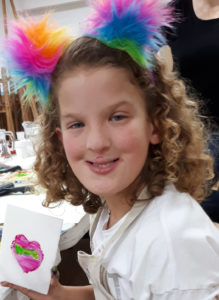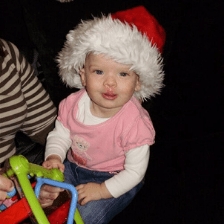To date, Ela has had 12 operations on her cleft, the first when she was six-months old. Once Ela has stopped growing, she will be offered cosmetic surgery to have her cleft reworked if she chooses to.
Ela first became aware of her visible difference when she was seven.
Will, Ela’s dad, explains, “I can vividly remember driving Ela home from school one afternoon, she was around seven years old, and she just said ‘Dad, why am I different, what’s wrong with me?’. I was gobsmacked. I knew she would ask us one day, but I just wasn’t prepared for it in that moment.
As parents we just ‘get on with it’ and push our own feelings to one side. Yet to allow us to support our children best, we first need to help ourselves and get the support that we need.
“We got home, and we all sat down together as a family. We looked back at all the baby photos and started talking about why Ela looked different to other children”.
Ela remembers, “We were looking through lots of family photos, and my brother thought my cleft looked like an ant, but my mum said it looks like love hearts”.
Ela’s primary school were very supportive, she had a teaching assistant throughout her time there. Ela says: “My support teacher was brilliant; I could tell her anything. I missed being able to say goodbye properly because of the Coronavirus, but I sent her a card to say a special thank you”.
As Ela got older, she became more aware of people staring, or children asking her about her visible difference. Lisa and Will, Ela’s parents, tried to find some specialist support to help Ela manage the emotional and wellbeing impact of having a visible difference.
Lisa, Ela’s mum, explains, “As a parent you have to do your research into what support is on offer. In our experience there is lots of support for parents when children are very young and later in their teenage years, coinciding with treatment. We’ve also found it helpful to socialise with other families through events like the local annual cleft fun day.
“When Ela was around eight, it became clear to us that she needed some emotional support, but we were told that she was too young, or there wasn’t anything available. Then, through one of the fun days, we found Changing Faces. Knowing there was someone for Ela to talk to was a relief, we had finally found that emotional support Ela so desperately needed”.
Ela, and her family, became clients of the Changing Faces Children and Young People’s Service team.
Will and Lisa: “Changing Faces has provided Ela with the skills and confidence to talk to other children that may ask questions or stare. Ela has gained a better understanding of what makes a good friend and how they can support her, both in and out of school. They have shown Ela how to have a positive mindset and how to use breathing techniques that can help her in a difficult situation”.
Ela explains: “I would say that if you are a young person with a visible difference you should talk to Changing Faces because they are kind, they will listen to everything you say and you can trust them with anything. They help and give great advice on what to do if someone asks a question. Plus every time we went to Sheffield I got to have tea out and get a big hot chocolate!”
Lisa was also born with a cleft lip and describes how Changing Faces involve the whole family: “I was born with a cleft lip too, and had a few operations to repair it. When I was growing up, I had support from my family and friends, but there was no counselling available for either me or my parents. As Ela’s mum I had always felt guilt that she had to have operation after operation and deal with staring because of me, and it was my fault she had a cleft.
If anyone is being bullied because of their visible difference I would say, you should stand up for yourself and don’t let anyone bring you down no matter what. You are beautiful.
“With the work from Changing Faces I have been supported too, and come to terms with the fact that it is not my fault, it’s just part of nature and I should not feel guilt. Changing Faces involved our whole family, even Ela’s younger brother George has been able to join in some of the workshops.
“Having a child with a visible difference can be challenging and Changing Faces has supported us as Ela grows into a young, independent, individual, including how we could best support her on the transition into secondary school. We are really proud of how well she is doing and that she is making new friends”.
Ela’s settling into secondary school, and enjoying it so far, particularly getting to meet the school dog, Dylan. Ela explains: “I have had one boy who told me that my cleft scars look ugly. It did upset me, but I’ve also made some great new friends. If anyone is being bullied because of their visible difference I would say, ‘you should stand up for yourself and don’t let anyone bring you down no matter what. You are beautiful”.
Lisa says: “My top bit of advice to any parent is to know that it is ‘okay to not be okay’. As parents we just ‘get on with it’ and push our own feelings to one side. Yet to allow us to support our children best, we first need to help ourselves and get the support that we need”.
Ela and her family are now helping us reach more parents and carers to tell them about the support available from Changing Faces. They took part in our Christmas 2020 fundraising appeal, have shared their story with the media and spoken at our workshops for children and families.
